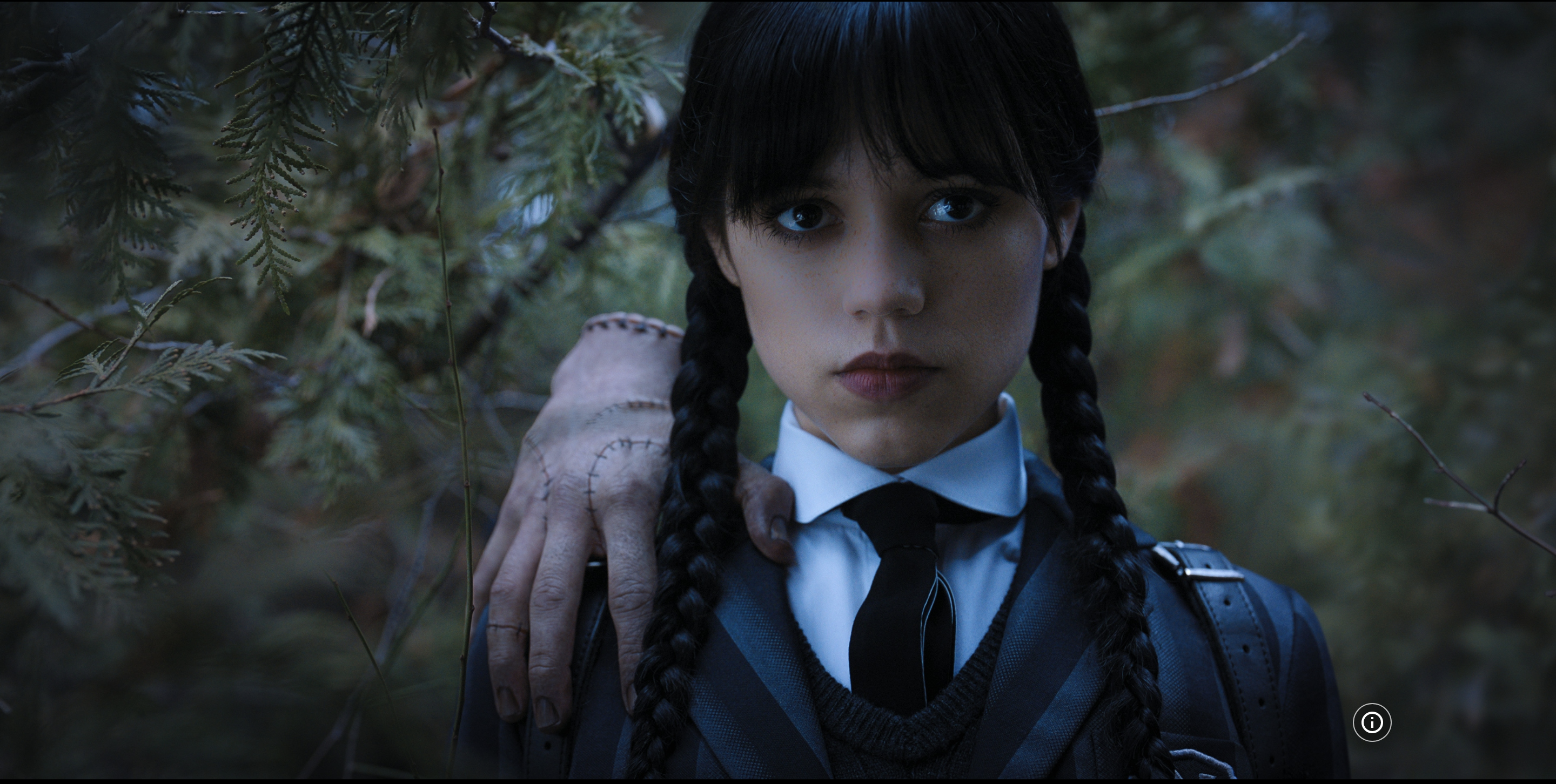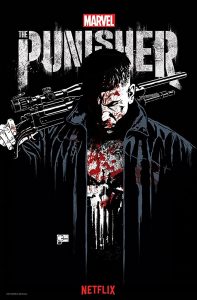On Nov. 23, Netflix released the highly anticipated new series Wednesday. The show is the latest addition to the Addams Family universe, creating a storyline for the infamous daughter, Wednesday (Jenna Ortega). The show follows Wednesday Addams as she navigates through Nevermore, a boarding school that is specifically for “outcasts.” These “outcasts” are people similar to the Addamses, those who are gifted with supernatural powers.
Wednesday does its best—and even succeeds, at some points—at putting the structures of the Addams family franchise in a 21st-century world, but also leaves the viewer with moments of cringe and confusion. The show is rated TV-14 though, so having that younger audience excuses some of its childish tropes.
Since its announcement in Oct. 2020, Wednesday has gained significant attention online. With a new addition to the fan-favorite franchise, along with Disney fans’ excitement over Jenna Ortega’s casting as Wednesday, it was clear from the beginning Wednesday was going to be watched. Since Wednesday has been released, it has broken Netflix’s viewing record, formerly held by Stranger Things 4, in its debut week at 334 billion hours viewed. With only eight 45-minute episodes, the show is perfectly bingeable over a day or two with the story keeping watchers entertained and hungry for more the whole way through.
After attempting to murder an entire swim team for bullying her brother—just one of her instances of violence amongst many in various public schools she’d attended—Wednesday is sent to Nevermore to find a place where she can fit in. The school is the same one her parents, Morticia and Gomez (Catherine Zeta-Jones and Luis Guzmán), attended. Before she arrives though, Wednesday starts experiencing psychic visions, which help her along the way as she attempts to solve the hidden mysteries that lurk within Nevermore.
Originally, Wednesday is attempting to escape Nevermore, implied due to her rebellious teenage tendencies. However, as she tries to escape, her psychic visions introduce her to the captivating secrets of Nevermore. And after an attempted murder on her life, Wednesday finds that she may be more deeply connected to the school than she once thought, causing her to stay.
On top of solving all the mysteries, Wednesday must go through the social aspects of high school. Nevermore is full of other “outcasts,” with every student having some type of supernatural power. It is in Wednesday’s first experiences with the other students that the viewer begins to understand the dynamics of Nevermore and the broader universe of this version of the Addams Family: people inherit their traits from their parents, and every faction of the supernatural has its own situations to deal with. This dynamic keeps the other characters’ arcs just as interesting as Wednesday’s, which is definitely a plus from the series.
But just because they all have supernatural powers doesn’t mean Wednesday fits in. Her experiences in dealing with a new environment as a teenager keep her from uncovering the mysteries of her new school. Her roommate is overly hovering, she is caught in a love triangle, and she must work through her mommy issues in school-required therapy sessions.
When it comes to the execution of Wednesday’s story, the show is quite dark. It casually includes conversations about how many assaults Wednesday has committed, along with visual gore to emphasize this violence. Even her father Gomez’s pet names for her such as “my little death trap” and “my little storm cloud” highlight her family’s impression of her persona. Wednesday is recognizably odd by other students at Nevermore too, being called a psychopath on her first day.
The classic darkness from the original The Addams Family TV series (which ran from 1964-1966) also finds itself in the 2022 addition with Easter eggs sprinkled throughout the show. The iconic double-snap that ends the theme song of the original series ends up being a key to an important turning point in Wednesday’s investigations. Thing (Victor Dorobantu), a cut-off hand that is featured as a side character in the original series, ends up being an incredible help to Wednesday. These types of Easter eggs don’t particularly add to the story, but it’s fun for a viewer to understand these references.
Besides just the plot line, Jenna Ortega does an excellent job as Wednesday, presenting her deadpan energy while still keeping watchers engaged with her next move. The character Wednesday has been described as many women’s first goth inspiration, so many were excited to see the new adaptation by Ortega. Her dance sequence during a school dance has circulated around the Internet in the past week. On her Twitter, Ortega has said she used archival footage of goth dancers in the 1980s as inspiration. The dance features the iconic dance moves of the original Wednesday while having a 21st-century flare to them.
The show does fail at some points, with certain aspects of the show demonstrating “Disney-cheese,” as one Twitter user puts it. Awkward climactic scenes of a high school dance, seemingly forced romance, and crappy CGI are the show’s biggest downfalls. Wednesday’s character is depicted as being almost heartless, constantly rejecting affection and having a deadpan tone throughout the entire series.
Wednesday finds herself caught in a love triangle, but her inexpressive energy does not give off any signs of flirting. Wednesday’s monotone seems to make it clear she is not interested in romance, or friendship even; instead, she turns away from her social circles to focus on solving her mysteries. Instead of her lack of care being respected, she is fought over by two men and thrown a surprise birthday party. The over affection other characters show to Wednesday of other characters is unrealistic for a viewer, as most would recognize that being unempathetic and unfriendly to others doesn’t help to make friends. This makes Wednesday’s relationships seem rushed, possibly causing the viewer to cringe during a forced emotional scene, and overall making any relationship development less impactful.
Another issue the show runs into is some controversy. But within the show, Netflix attempts at covering too much ground when they discuss real-life social issues and place them into the world of Nevermore. Specifically, the show brings up colonization as a subplot.
The school Nevermore sits right next to a town called Jericho, which celebrates the founder of their town, Joseph Crackstone (William Houston) during a Harvest Day festival. Through a vision, Wednesday realizes she has an ancestral connection to one of the victims of Crackstone, who hated outcasts.
Critics have long seen The Addams Family as an allegory for an immigrant family, with their oddness representing what it may feel like as an outsider in a new country. Many can remember the iconic scene from Addams Family Values (1993) which features a speech from Wednesday on the true history of Thanksgiving, without situating herself as an Indigenous person.
But the 2022 adaptation seems to take a different route, insinuating the Addams family are victims of colonization. By calling Crackstone a “pilgrim”, the show implies that these outcasts are an allegory for Indigenous Americans. But it isn’t made clear whether Wednesday herself is indigenous, or if all outcasts in Jericho were victims of this colonization. Wednesday’s lack of explanation here causes these words to be interpreted as interchangeable by the viewer. Netflix unintentionally equating Indigenous people to the abnormal people of Nevermore, is not a good message.
This also makes the show confusing at points. We understand why Wednesday might feel the need to avenge her ancestor and uncover the truth of Nevermore’s establishment, but instead, we are thrown into anti-colonial jargon. Wednesday has two scenes denouncing colonization, describing Jericho’s Harvest Day Festival as a “whitewashing of history” and Crackstone’s pilgrims as “ religious zealots who caused mass genocide”. This is an allegory to our celebrations of Thanksgiving and is absolutely true, but Wednesday fails to execute this discussion thoroughly.
Though an important topic to bring to mainstream media, the colonization arc doesn’t end up going anywhere, and the viewer may be confused on how integral Wednesday’s ethnic identity is to the storyline. Additionally, the lack of expansion on such an important topic causes the anti-colonial conversations to seem more like a grab for quick internet conversation.
Attempting to include such complicated topics in an also complex fantastical world can make the watcher ask questions that don’t become relevant to the main plotline of Wednesday. Wednesday falls short of expanding the colonization discussion, and only ends up confusing the viewer as they attempt to understand how this information plays a role in Wednesday’s adventures.
This mishandling of such an important topic brings to mind the dark shadow that already lurks over the show with a director who has a history of racist comments. Wednesday’s director, Tim Burton made comments on intentionally not including characters of color in his films. His position as the director is already problematic in and of itself, but Netflix’s botching of a conversation on colonization shows a lack of consideration for viewers of color.
Wednesday is an interesting watch, but the lack of completion of relationships and plotlines significantly decreases the impactfulness of the show. But besides the cringe, its excellent performance from Ortega captivates viewers. While Wednesday may not offer much in terms of social commentary or quality television, it’s still worth watching due to its uniqueness, nostalgia, and humor.





